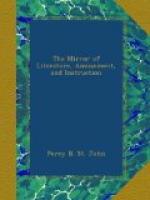Robin Oig stopped, half embarrassed, half laughing, and signing to those around that he only complied with the old woman to soothe her humour. In the meantime, she traced around him, with wavering steps, the propitiation, which some have thought has been derived from the Druidical mythology. It consists, as is well known, in the person who makes the deasil, walking three times round the person who is the object of the ceremony, taking care to move according to the course of the sun. At once, however, she stopped short, and exclaimed, in a voice of alarm and horror, “Grandson of my father, there is blood on your hand.” “Hush, for God’s sake, aunt,” said Robin Oig; “you will bring more trouble on yourself with this Taishataragh (second sight) than you will be able to get out of for many a day.”
The old woman only repeated, with a ghastly look, “There is blood on your hand, and it is English blood. The blood of the Gael is richer and redder. Let us see—let us—”
Ere Robin Oig could prevent her, which, indeed, could only have been by positive violence, so hasty and peremptory were her proceedings, she had drawn from his side the dirk which lodged in the folds of his plaid, and held it up, exclaiming, although the weapon gleamed clear and bright in the sun, “Blood, blood—Saxon blood again. Robin Oig M’Combich, go not this day to England!”
“Prutt, trutt,” answered Robin Oig, “that will never do neither—it would be next thing to running the country. For shame, Muhme—give me the dirk. You cannot tell by the colour the difference betwixt the blood of a black bullock and a white one, and you speak of knowing Saxon from Gaelic blood. All men have their blood from Adam, Muhme. Give me my skenedhu, and let me go on my road. I should have been half way to Stirling brig by this time—Give me my dirk, and let me go.”
“Never will I give it to you,” said the old woman—“Never will I quit my hold on your plaid, unless you promise me not to wear that unhappy weapon.”
The women around him urged him also, saying few of his aunt’s words fell to the ground; and as the Lowland farmers continued to look moodily on the scene, Robin Oig determined to close it at any sacrifice.
“Well, then,” said the young drover, giving the scabbard of the weapon to Hugh Morrison, “you Lowlanders care nothing for these freats. Keep my dirk for me. I cannot give it you, because it was my father’s; but your drove follows ours, and I am content it should be in your keeping, not in mine. Will this do, Muhme?”
“It must”, said the old woman—“that is, if the Lowlander is mad enough to carry the knife.”
The strong westlandman laughed aloud.
“Good wife,” said he, “I am Hugh Morrison from Glenae, come of the Manly Morrisons of auld langsyne, that never took short weapon against a man in their lives. And neither needed they; they had their broadswords, and I have this bit supple (showing a formidable cudgel)—for dirking ower the board, I leave that to John Highlandman. Ye needna snort, none of you Highlanders, and you in especial, Robin. I’ll keep the bit knife, if you are feared for the auld spae-wife’s tale, and give it back to you whenever you want it.”




